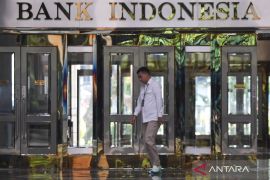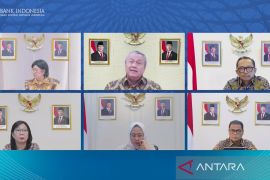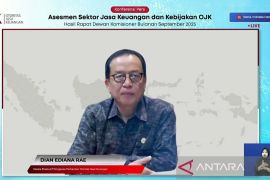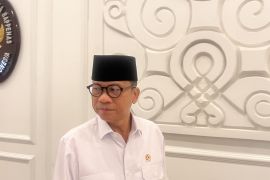"We`re principally letting it (the appreciation) become a tool (with which to vent off the inflationary pressures)," BI deputy governor Hartadi A Sarwono said on Thursday (Feb 24), adding BI would not try to reach a certain ceiling to what point the rupiah may appreciate against the greenback.
The rupiah has appreciated to 8,845 to the US dollar last week from the previous stabilized level of 9,000 since early February.
Sarwono said the direct reason for the rupiah`s upward trend has been the rush of capital inflow following BI`s new policy on its basic rate, adding BI is anticipative of inflationary pressures in the days ahead as the inflation may be spurred by the surging of oil prices and foodstuff imports.
Bank Indonesia earlier this month raised its benchmark overnight rate by 25 basis points to 6.75 percent after inflation continued to stubbornly hover above its 2011 year-end target of between 4.0-6.0 percent.
BI seems actually to be in the position to rein in the rupiah`s appreciative tendency as BI Governor Darmin Nasution disclosed last Friday (Feb 25) that the foreign exchange reserve will likely rise to between 110 billion-120 billion dollars by end of the year.
The reserves were at 97.7 billion dollars as of February 22, a 2.4 billion dollars increase from end of January, partly due to foreign fund inflows.
In its 2011 policy announced last month, BI will bolster the monetary and macro-prudential policy mix, while strengthened it through considering all available instruments for optimal calibration. But some unforeseen circumstances have clearly forced it to make improvisations.
The policy rate was said to be made remaining consistent and congruous to the achievement of the inflation target set, specifically 5.0 percent approximately 1.0 percent and 4.5 percent approximately 1.0 percent in 2011 and 2012 respectively, by paying attention to the risk of inflationary pressures that are expected to intensify looking ahead.
The exchange rate was envisaged to assist the achievement of the inflation target, consistent with the accomplishment of other macroeconomic targets, as well as provide assurance to the business community. The possible trinity will consist of an optimal configuration of exchange rate stabilization, controlling capital flows and an interest rate response, it said.
In other words, considering the panoply of complexities faced, BI said, Indonesia will overcome the impossible trinity by administering a middle ground solution, not a corner solution.
Monetary operations and macro-prudential policy to control domestic liquidity will remain consistent and support the policy rate in order to meet the inflation target and control domestic demand.
Amid a deluge of capital inflows, raising the statutory reserve requirement for foreign exchange shored up bank liquidity management. Meanwhile, limiting the daily position of short-term foreign bank loans cemented prudential principles in the control of such loans.
The formulation and implementation of this policy mix is crucial considering the interconnectedness between monetary stability and financial stability. BI is to continue to calibrate its policy mix in order to optimize monetary stability, financial system stability and sustainable economic growth.
Dilemma
"The situation is really dilemmatic, but BI has apparently prioritized more on curbing the inflation," Latif Adam, economic observer with the Indonesian Science Institute (LIPI) said in response to a question posed by ANTARA on the rationale of BI`s policy, on Friday (Feb 25).
Adam said the step taken by BI for curbing inflation is the right and not a hasty one. "I think BI has taken the right step and, for sure, it has long considered surge in the prices of crude oil has been the main reason."
The world price of crude oil, Adam said, is the strongest triggering point of the inflation as it has hit the level of 113 US dollars per barrel in the middle of the week. "Oil price has skyrocketed to more than 100 dollars per barrel. It certainly will have a big influence on prices."
Gesturing an understanding of BI`s anti-inflation step, Adam, a senior economic researcher with LIPI`s Economic Research Center, noted that the inflation in January was 7.02 percent on a year-on-year basis, the second highest inflation in ASEAN.
"BI however needs to keep monitoring inflationary pressure on one hand, while on the other hand it juggles the rupiah rate through letting it appreciate," Adam said, explaining that the two components are delicately difficult to severe as a strengthening rupiah will exerting impacts on the manufacturing industries.
Sofyan Wanandi, Indonesian Businessmen Association (Apindo) chair, has also seen the policy from another perspective, emphasizing his apprehension that a very strong rupiah might disturb Indonesia`s exports of manufactured goods. The policy might even cause death to exports.
"Don`t take a hasty step, a precaution is needed here. Don`t make us (Indonesian Exporters) victim of the impact," Wanandi said in an interview last weekend (Feb 25).
Wanandi said part of BI`s policy to create a strong rupiah must have something to do with the government`s huge expenditure for import strategic commodities this year, most of all rice, so that there would be less dollars spent. Various arguments are already been forwarded as a rationale for resorting to imports.
The government should have actually been wiser in this regard, he said, shortfalls in agricultural production would better be tackled by improving production and not simply importing more. "The government imported 1.2 million tons of rice and this year it will become 1.75 million tons," Wanandi sid.
Wanandi reminded the government on its import policy of agricultural products that might bring unwanted effects. "There are imports that are actually easy to produce domestically such rise and salt, so why importing them," he said.
Despite corroborating to the argument on the surging price of crude oil, Wanandi nevertheless said the upward trend of oil price much had something to do with the on-going political upheavals in North African countries, including the important oil exporting Libya.
"The instability in North African and some Middle Eastern countries have triggered the soaring prices of oil, yet it is expected that oil price will return to normal as the situation in those countries calm down," Wanandi said. (*)
Reporter: By Vicki Febrianto
Editor: Kunto Wibisono
Copyright © ANTARA 2011











